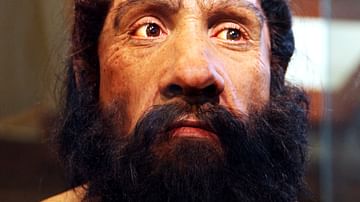Search
Search Results

Definition
Neanderthal
Neanderthals are an extinct group of fossil humans that appeared in Western Eurasia in the mid-Middle Pleistocene and shared the stage with the first modern humans arriving in Europe from around 45,000 years ago, before disappearing from...

Definition
The Vedas
The Vedas are the religious texts which inform the religion of Hinduism (also known as Sanatan Dharma meaning “Eternal Order” or “Eternal Path”). The term veda means “knowledge” in that they are thought to contain the fundamental knowledge...

Definition
Homo Habilis
Homo habilis ("handy man") is an extinct species of human that lived in East and South Africa between 2.3 and 1.5 million years ago and plays an interesting role in the discussion surrounding the dawn of our genus of Homo, which is thought...

Definition
Baal
Baal (also given as Ba'al) is a Canaanite-Phoenician god of fertility and weather, specifically rainstorms. The name was also used as a title, however, meaning "Lord" and was applied to a number of different deities throughout the ancient...

Definition
God
God' is the common word for the identity of a higher being in the universe beyond our world, the creator of all known existence, and who rules in conjunction with lower gradients of divinity (angels). In Greek, theikos ("divine") meant to...

Definition
Enlil
Enlil (also known as Ellil and Nunamnir) was the Sumerian god of the air in the Mesopotamian Pantheon but was more powerful than any other elemental deities and eventually was worshiped as King of the Gods. He is featured in a number of important...

Article
The Divinity of Jesus
In the decades of the 20s and 30s of the 1st century CE, a Jew from the town of Nazareth in the Galilee began preaching that the God of Israel would soon intervene in history, restoring that nation to God's original plan and glory. From this...

Definition
Ra (Egyptian God)
Ra (also given as Re) is the sun god of ancient Egypt. He is one of the oldest deities in the Egyptian pantheon and was later merged with others such as Horus, becoming Ra-Horakhty (the morning sun), Amun (as noonday sun), and Atum (the evening...

Article
Egyptian Gods - The Complete List
The gods and goddesses of Ancient Egypt were an integral part of the people's everyday lives for over 3,000 years. There were over 2,000 deities in the Egyptian pantheon, many whose names are well known - Isis, Osiris, Horus, Amun, Ra, Hathor...

Definition
Ghosts in the Ancient World
A belief in an afterlife was central to every major civilization of the ancient world and this encouraged the recognition of the reality of ghosts as the spirits of the departed who, for one reason or another, either returned from the realm...